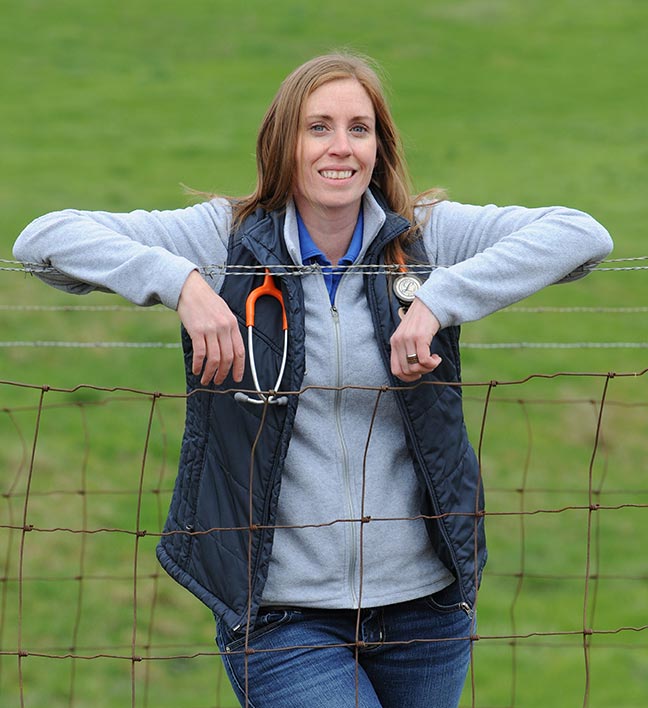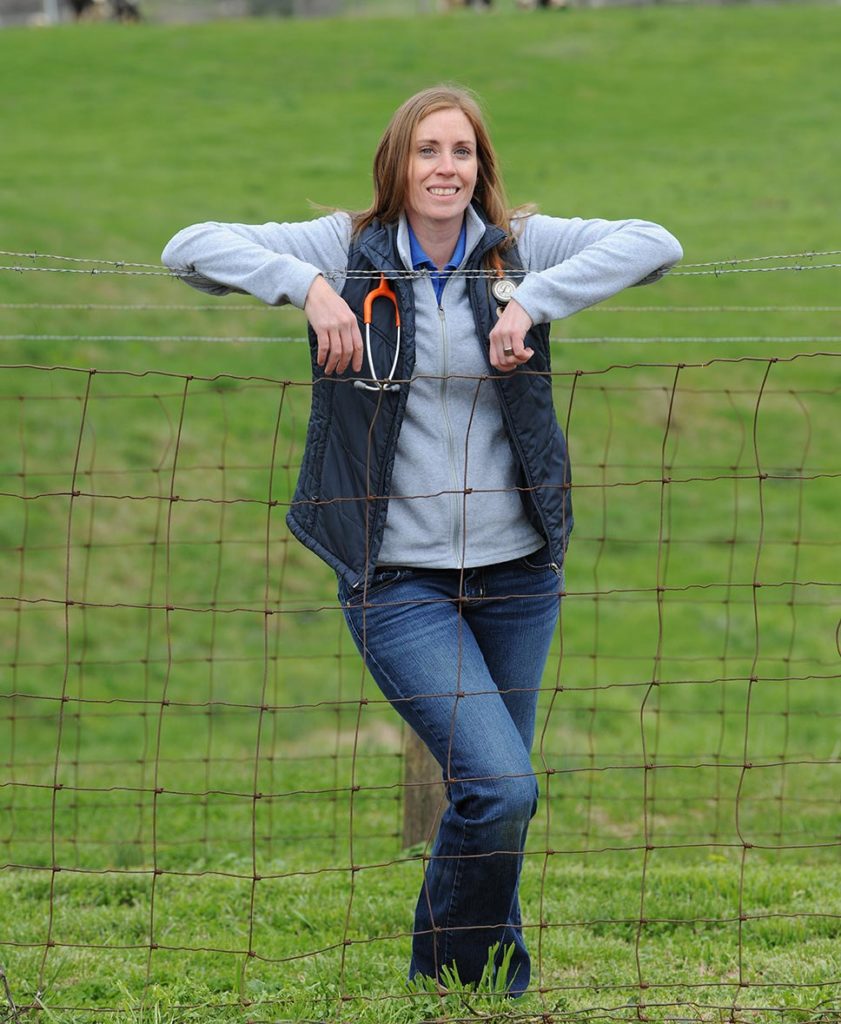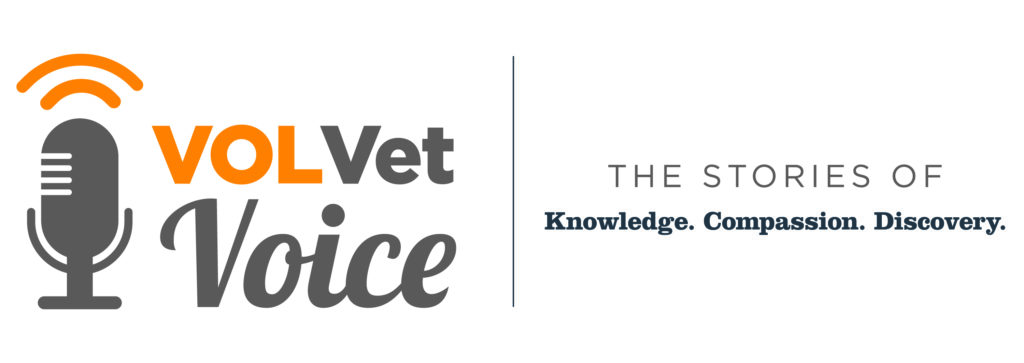

Dr. Andi Lear‘s clinical interests at the University of Tennessee College of Veterinary Medicine are related to livestock medicine and surgery including infectious diseases, herd outbreak investigation, backyard milk quality, neonatology, along with small ruminant and camelid herd health. In this episode of VOLVet Voice, the assistant professor discusses her research focus: maternal-fetal interactions including placental immunology and reproductive physiology, compromised pregnancies associated with infectious disease, assessment of fetal viability and well-being, and neonatal outcomes following compromised pregnancies.
VOLVet Voice is a podcast produced by the UT College of Veterinary Medicine that shares the stories of Knowledge, Compassion, and Discovery from the college located on the campus of the UT Institute of Agriculture in Knoxville, Tennessee.

Podcast Transcription: VOLVetVoice: Andi Lear “Making a difference in Farm Animal Medicine”
Welcome to VOLVet Voice podcast; we’re bringing you the stories of Knowledge, Compassion, and Discovery from the University of Tennessee College of Veterinary Medicine located on the campus of the UT Institute of Agriculture in Knoxville, Tennessee.
My passion for veterinary medicine has changed dramatically over the last few years
Meet Dr. Andi Lear, a specialist in large animal internal medicine and assistant professor at the University of Tennessee College of Veterinary Medicine. She works in the farm animal field service that provides ambulatory veterinary care for farm animals in the surrounding region.
Farm animal field services is a very rewarding area to work in–#1 you get to work with a variety of species—so a flavor of the week can change. On top of that, you get to be in the field in the animals’ environment and get to meet the stakeholders, producers, and owners of these animals in their environment which is very rewarding and you get out and about in the beautiful hills of east Tennessee. But also it makes it exciting because you don’t always have a controlled environment to work with these animals, so you have to be creative to ensure the animals are safely and adequately cared for out in the real world.
Initially, I got into veterinary medicine to help animals and to help people, whether that be an economic situation with food-producing animals, but now I really enjoy veterinary medicine more for the variety and way we can interact with so many groups of people. I really enjoy the mentorship, the educating future of veterinary medicine, educating producers how to not only identify sick individual animals but also how they can manage and care for their herd or flock and improve their well being and possibly make more money from their animals, but I also enjoy the fact that veterinary medicine allows me to do research which is my primary passion right now. I really enjoy doing clinical medicine but I really enjoy the idea and projects we get to perform to make a greater impact on the wellbeing of animals in this country.
The overall broad umbrella of our research revolves around understanding maternal and fetal interactions during pregnancy and also how the maternal environment can influence the baby once it’s born and walking around breathing in the real world. We do a variety of investigations to understand how does the environment between mother and child change during pregnancy—especially when pregnancy is compromised in some way. That could be a maternal stress but mostly interested in compromised pregnancies during times of infectious diseases. In that regard, besides understanding the interactions there, we also care about how do we monitor and measure how well the placenta and baby are doing during those challenging pregnancies. Are there biomarkers or non-invasive measurement strategies that we can implement to give us an idea of how well the baby is faring when pregnancies don’t go as planned and the mother is unhealthy for some reason? On the far sides of that, besides the challenges during a compromised pregnancy and how that can affect the baby in utero, when the baby is born –how is that pregnancy or maternal environment affecting how that baby will function in the real world—will it be a productive member of the herd or will it always have an uphill battle to get over because it had a bad start to life.
Even though we primarily use livestock or sheep or cattle and we evaluate the maternal-fetal environment in those species which matters to our agricultural environment and agricultural community, we want to maintain a happy healthy good source of nutrition for our consumers in the country, these animals serve as a model of human development—understanding how can we take info gain from sheep or cattle and apply to human knowledge or human health as well. Sheep are very well published or described models for human pregnancy because of the way fetal lamb develops in utero, especially the way the fetal lamb’s brain and nervous system tissue develops, it parallels human pregnancies quite well. Where you look at published literature where they use an animal model to understand the possible human comparison, fetal lambs are the primary source. Most of the publications are looking at maternal stress either poor nutrition or over nutrition, fetal alcohol syndrome, toxins things like that more in the environment of fetal development, on our side we really are looking at infectious challenges to the fetal environment. For instance, can we take a viral infection, infect that dam and the mother may not be sick but the baby could suffer consequences of maternal and fetal infection. So there are many viruses that parallel both in livestock and humans. For instance, previously evaluated some economically important livestock viruses and their effect on the maternal-fetal environment such as bovine viral diarrhea virus that is somewhat similar to Zika virus. We have actually used Zika virus in sheep as a model to understand what’s going on in humans, but there is a variety of other things we can use these models for to get a better understanding of how to help human wellbeing.
So on the day that I retire, if I were going to say what do I want the final culmination of research to have manifested to, I would say that I should be able to look back and see the distinct discovery of knowledge that can be translated into clinically applicable practices. So meaning we do this research to look at the maternal-fetal interactions, but really what does that matter? How can we improve the well-being of these animals, how can we recover a pregnancy that is compromised? How can we monitor or diagnose that the pregnancy has been affected and overall what are we going to do about it to affect the health and welfare and wellbeing of these animals and possibly even humans?
Thank you for joining us for this episode of VOLVet Voice, a podcast that shares the stories of discovery that create Real. Life. Solutions at the Univeristy of Tennessee College of Veterinary Medicine located on the campus of the UT Institute of Agriculture.